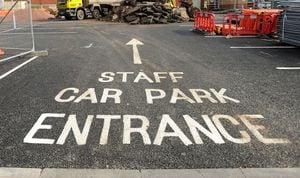LETTER: Comprehensive strategy needed to solve hospital parking issues
A reader discusses the issues of hospital parking charges and the need for a proper strategy around the problem.

I was concerned to read the article by Lisa O’Brien about the calls for the permanent scrapping of NHS staff parking charges since it fails to present the issue in its full context.
Whilst I would in no way wish to denegrate the superb and dedicated efforts of NHS staff during the coronavirus pandemic, scrapping car parking charges is not the right way of rewarding this. Abolishing the charges will only encourage more staff to use cars to get to work, thus exacerbating an already acute problem with a lack of spaces at most hospitals including the Royal Shrewsbury. What is needed is a comprehensive transport strategy to overcome the problem.
About 25 years ago I was a member of a steering committee at Derriford Hospital near Plymouth tasked with implementing a green transport strategy and reducing the need for car parking spaces for both staff and visitors. Along with Arthur Wilson, chief executive of the hospital, and his colleagues, principal officers of the city council, senior officers of the two local bus companies (of whom I was one), and Professor John Whitelegg of Lancaster University, we devised a radical transport policy which included car parking charges for staff who did not need to use their cars once at work, improved facilities for cyclists, improved bus services, more bus priorities, better information about public transport, and a cheap area travel card valid on both bus operators’ services at any time of day. Whilst the scheme was not without its opponents, it was introduced and was very successful with the usage on the Western National buses to and from the hospital (which I managed) increasing by 43 per cent in the first year.
Subsequently when I was working for Shropshire County Council about 15 years ago, I together with officers of Arriva drew up a strategy aimed at reducing the car parking problem at the Royal Shrewsbury Hospital, which included the introduction of a park and ride service and bus priorities. I wrote to the hospital’s chief executive, asking that this be considered but sadly the council never received a reply.
Whilst we certainly need to reward frontline NHS staff, the car parking issue needs a radical multi-modal strategy not the encouragement of more car parking.
Tim Wastling, Newtown





